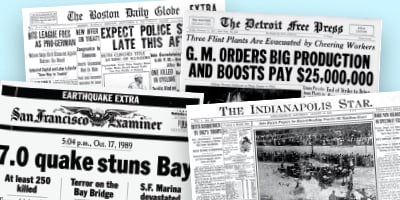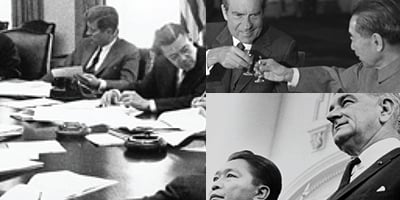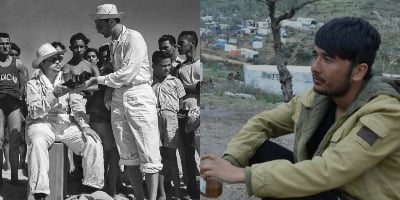Unveiling the personal narratives that help us understand the impact of genocides worldwide
The Visual History Archive (VHA) is an invaluable primary source repository, containing over 56,000 audio-visual interviews with survivors and witnesses of genocides globally. This vast collection grants access to the personal stories and individual experiences that embody the far-reaching impact of genocide, providing essential context to researchers and learners worldwide. Equipped with a user-friendly interface, advanced search capabilities, and a growing collection of transcripts, this ever-growing database empowers users to explore, analyze, and gain deep insights into the complexities and consequences of historical atrocities.
ProQuest is proud to collaborate with USC Shoah Foundation to provide access to the full archive, while also facilitating the creation of transcripts in more than 40 languages. This monumental undertaking not only expands the Visual History Archive index but also expands the search possibilities within testimonies, fostering enhanced research and discovery.
The Visual History Archive encompasses firsthand testimonies covering a range of historical tragedies, including the 1994 Genocide against the Tutsi in Rwanda, the Anti-Rohingya Mass Violence in 2017, the Armenian Genocide (1915-1923), the Cambodian Genocide from (1975-1979), the Central African Republic Conflict (2012-2013), the European Holocaust (1939-1945), the Guatemalan Genocide (1978-1996), the Nanjing Massacre in 1937, the ongoing South Sudan Civil War since 2013, and the War and Genocide in Bosnia and Herzegovina (1992-1995). These testimonies provide unique perspectives, shedding light on the experiences of survivors, witnesses, and those impacted by these profound historical events.
Customer Resources
View the Visual History Archive Brochure
Find training and informational resources - including Accessibility
Visit this support page to learn more about the new features and benefits
Video Testimonies
Languages
Using Visual History Archive in Research, Teaching, and Learning
Tel Aviv University
Primary sources are essential for ongoing Holocaust research – an area in which Tel Aviv University has an active and growing research community. The library team have found a way to improve the range and discoverability of their primary sources by partnering with ProQuest to provide access to the USC Shoah Foundation Visual History Archive. This one-of-a-kind collection brings together streaming video testimonies from survivors of and witnesses to the Holocaust and other crimes against humanity.
Read case studyBring Content to Advanced Language Course
Professor Keaveney’s upper-level French course explores themes of love, loss, collective and personal memory, and modernity through readings of French literary texts, theoretical readings, films, poems, and songs. One of the texts used in the class is the French novel Dora Bruder, which tells the story of a young girl who was sent to Auschwitz. The book combines different aspects of memory, loss, life, chronology, and French history, and reconstructs what the girl’s life may have been like, even though very little is known about her.
Read case studyIlluminating Depictions of Wartime Atrocities
Professor Roxworthy’s course Animation, Simulation, and Performance focuses on graphic representations of war, such as comic books, animated films, and video games about World War II and the global war on terror. Students learn how to analyze still and moving images of wartime atrocities, particularly in terms of the impact that different representational media have on the communicative power of these images.
Read case studyFrom the viewpoint of historians, the most important benefit of using testimonies is that they bring into history events that would otherwise remain completely unknown, since they are missing from conventional documentation found in archives—most of which was written by perpetrators and organizers of genocide. Testimonies can save events from oblivion, but they can also provide very different perspectives of events known through conventional documentation.
Omer Bartov, John P. Birkelund, Distinguished Professor of European History and Professor of History and Professor of German Studies, Brown University
Using Visual History Archive for Research, Teaching, and Learning a Varity of Topics
Gender and Identity
The Visual History Archive contains thousands of testimonies discussing topics and issues related to gender and identity. Available searchable terms related to gender and identity lead to exact moments in testimonies where these topics are discussed by many groups of interviewees, including survivors and witnesses of the Holocaust, Rwandan genocide, Armenian Genocide, and other crimes against humanity.
Read moreGeography
The Visual History Archive contains thousands of geographical location terms that span five continents and include historical and existing places, specific forests, mountains, rivers, and lakes, and hundreds of thematic terms related to place, space, and the movement of people. These searchable terms lead to exact moments in testimonies where the topics are discussed, and the VHA infrastructure includes vast geographic metadata, including latitudes and longitudes of all locations.
Read moreLaw
The Visual History Archive contains thousands of testimonies by survivors of genocide attesting to the ways in which legal mechanisms were employed to oppress, divide, and inflict violence upon targeted, marginalized groups. Many of the testimonies also address the legal means used to exact justice in the aftermath of these catastrophic human rights violations, including numerous trials that took place following the Holocaust and other genocides. The searchable terms below, and many others, lead to exact moments in testimonies where the topics are discussed, often accompanied by transcripts and useful metadata.
Read moreMedicine
The Visual History Archive contains thousands of testimonies by survivors of the Holocaust and other genocides discussing lack of medical care, eugenics, medical experimentation, and many related topics relevant to the field of medicine, with searchable terms leading to the exact moments where these themes are discussed. The archive also provides a vast amount of easily searchable, personalized, primary source data relevant to the intersection of medical and Holocaust studies, a burgeoning area of exploration particularly within the field of medical ethics.
Read morePolitical Beliefs, Age, and Social Class
The Visual History Archive contains over 55,000 oral history testimonies of interviewees of diverse age and social class background. More than 250 of these testimonies are by interviewees who were incarcerated by the Nazi regime as political opponents during the Second World War, including members of different political parties in occupied territories and members of resistance movements.
Read moreRace and Ethnicity
The Visual History Archive contains thousands of testimonies discussing topics and issues related to race and ethnicity. Available searchable terms related to these concepts lead to exact moments in testimonies where the topics are discussed by many groups of interviewees, often accompanied by transcripts and useful metadata.
Read moreReligion
The Visual History Archive contains thousands of testimonies by survivors and witnesses of genocide and mass violence attesting to the roles that faith, religion, and religious figures played in their experiences and survival of those events, as well as in their lives after genocide. The archive contains testimonies from members of many different faiths, including Judaism, Christianity, Buddhism, Islam, and others. The searchable terms below, and many others, lead to exact moments in testimonies where the topics are discussed, often accompanied by transcripts and useful metadata.
Read moreRelated Products

ProQuest Historical Newspapers: Global
Connects today’s headlines back to each title’s first issue including six regional and specialty collections spanning multiple continents. This academic resource offers over 200 premier newspapers from the U.S., Canada, and international regions, presented as originally printed. It provides researchers and students with exceptional access to primary sources, with events reported as they happened and continue to unfold.
Read more
Digital National Security Archive
Winner of the 2018 Choice Outstanding Academic Title Award, this collection offers access to primary documents from the U.S. National Security Archive. It is the most comprehensive collection available of significant primary documents central to U.S. foreign and military policy since 1945. This is a growing collection of declassified documents with content added each year.
Read More
Global Issues Library
Global Issues Library reflects the key issues affecting our world today, including border issues, migrations, atrocities and human rights violations, security, revolution and protest, incarceration, disasters, and environmental issues. Through historical and contemporary events found in this database, students and scholars can learn about and contextualize the issues that have transformed the human experience globally.
Read More